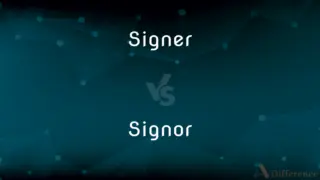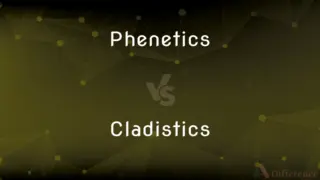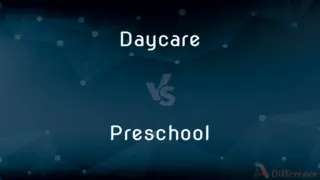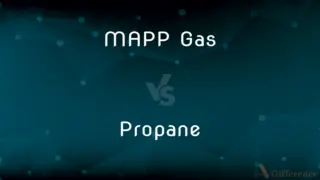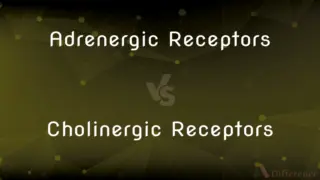Precept vs. Statute — What's the Difference?
Edited by Tayyaba Rehman — By Urooj Arif — Updated on April 8, 2024
A precept is a general rule intended to regulate behavior or thought, whereas a statute is a written law passed by a legislative body.

Difference Between Precept and Statute
Table of Contents
ADVERTISEMENT
Key Differences
A precept is a guideline or principle designed to influence conduct or action, often based on moral or ethical considerations. It is broader and more flexible in application, serving as a foundation for personal or organizational behavior. On the other hand, a statute is a formal and specific law enacted by a government's legislative branch. It has legal force, and its violation can lead to legal penalties.
Precepts are usually derived from philosophical, religious, or cultural beliefs and aim to guide individuals towards a certain way of living or thinking. They are not enforced by legal authorities but can be deeply ingrained in societal norms. Whereas, statutes are created through a formal legislative process and are enforced by legal systems. They are specific to the jurisdiction in which they are enacted and can result in legal consequences if breached.
While precepts encourage individuals to act in a certain way through moral persuasion or societal pressure, statutes compel compliance through the threat of legal action. This difference highlights the voluntary nature of following precepts versus the obligatory nature of adhering to statutes.
Precepts often deal with more abstract concepts such as justice, fairness, and kindness, which are open to interpretation. In contrast, statutes are written in precise legal language to minimize ambiguity and ensure clear understanding and enforcement.
The influence of precepts can be seen across various cultures and societies, transcending legal systems and geographical boundaries. Statutes, however, are specific to the legal framework of a particular country or region and reflect its unique social, political, and economic context.
ADVERTISEMENT
Comparison Chart
Definition
A general rule intended to regulate behavior or thought.
A written law passed by a legislative body.
Basis
Moral, ethical, philosophical, or cultural principles.
Legal authority and procedures.
Enforcement
Societal norms or personal discipline.
Legal system, with possible penalties for violations.
Scope
Broad and flexible, often applicable in various contexts.
Specific and detailed, limited to a particular jurisdiction.
Purpose
To guide individuals towards moral or ethical behavior.
To regulate specific actions or conditions legally.
Compare with Definitions
Precept
Aims to influence behavior through moral or ethical persuasion.
The community emphasized the precept of mutual respect to foster harmony.
Statute
Formally enacted by the government.
The new statute on environmental protection was passed by the legislature last year.
Precept
A principle that guides behavior or thought.
The precept of treating others as you wish to be treated guides many people's actions.
Statute
It has legal force and consequences.
Violating a traffic statute can result in fines or other penalties.
Precept
A suggestion or recommendation for conduct.
The teacher's precept was to always question and seek knowledge.
Statute
Applicable within a specific legal jurisdiction.
The statute on public gatherings varies from one state to another.
Precept
Often derived from cultural or religious teachings.
The precept of non-violence is central to many religious philosophies.
Statute
A law established by a legislative body.
The statute requires wearing helmets while riding motorcycles.
Precept
A moral rule or guideline.
Many societies uphold the precept of honesty as a foundational virtue.
Statute
Designed to regulate certain actions.
Statutes governing business practices aim to protect consumers and fair competition.
Precept
A precept (from the Latin: præcipere, to teach) is a commandment, instruction, or order intended as an authoritative rule of action.
Statute
A statute is a formal written enactment of a legislative authority that governs the legal entities of a city, state, or country by way of consent. Typically, statutes command or prohibit something, or declare policy.
Precept
A general rule intended to regulate behaviour or thought
The legal precept of being innocent until proven guilty
Children learn far more by example than by precept
Statute
A law enacted by a legislature.
Precept
A writ or warrant
The Commissioner issued precepts requiring the companies to provide information
Statute
A decree or edict, as of a ruler.
Precept
An order issued by one local authority to another specifying the rate of tax to be charged on its behalf
The precept required a supplementary rate of 6.1p in the pound
Statute
Written law, as laid down by the legislature.
Precept
A rule or principle prescribing a particular course of action or conduct.
Statute
An act of a corporation or of its founder, intended as a permanent rule or law; as, the statutes of a university.
Precept
(Law) A direction or order issued by an authority; a writ, command, or process.
Statute
An assemblage of farming servants (held possibly by statute) for the purpose of being hired; - called also statute fair.
Precept
A rule or principle, especially one governing personal conduct.
Precept guides, but example draws.
Statute
An act passed by a legislative body
Precept
(legal) A written command, especially a demand for payment.
Statute
Enacted by a legislative body;
Statute law
Codified written laws
Precept
(UK) An order issued by one local authority to another specifying the rate of tax to be charged on its behalf.
Precept
A rate or tax set by a precept.
Precept
To act as a preceptor; to teach a physician-in-training by supervising their clinical practice.
Precept
To teach (something) by precepts.
Precept
Any commandment, instruction, or order intended as an authoritative rule of action; esp., a command respecting moral conduct; an injunction; a rule.
For precept must be upon precept.
No arts are without their precepts.
Precept
A command in writing; a species of writ or process.
Precept
To teach by precepts.
Precept
Rule of personal conduct
Precept
A doctrine that is taught;
The teachings of religion
He believed all the Christian precepts
Common Curiosities
What is a precept?
A precept is a general guideline or principle intended to influence behavior or thought, often based on moral or ethical considerations.
How do precepts and statutes differ in enforcement?
Precepts are enforced through societal norms and personal discipline, whereas statutes are enforced by the legal system.
Who enforces statutes?
Statutes are enforced by governmental and legal authorities, such as police and courts.
Can a precept become a statute?
Yes, a precept based on widely accepted moral principles can be formalized into a statute through legislative processes.
How are precepts communicated?
Precepts are often communicated through cultural teachings, religious doctrines, or philosophical writings.
Are statutes applicable internationally?
No, statutes are specific to the jurisdiction in which they were enacted and do not have international authority.
Can statutes be changed?
Yes, statutes can be amended or repealed by the legislative body that enacted them.
What is a statute?
A statute is a specific law formally enacted by a legislative body and has legal consequences for violations.
Do precepts vary between cultures?
While the specifics of precepts can vary, many fundamental precepts, like those promoting honesty and respect, are common across cultures.
How specific are statutes?
Statutes are written in precise legal language to clearly define what is regulated, permitted, or prohibited.
Can violating a precept have legal consequences?
Generally, violating a precept does not have legal consequences unless the precept is also covered by a statute.
What happens if a statute is deemed unconstitutional?
If a statute is deemed unconstitutional, it can be invalidated by a court, removing its legal force.
What role do precepts play in society?
Precepts guide individual and societal behavior, promoting ethical and moral standards.
Are all statutes based on moral principles?
Not all statutes are directly based on moral principles; some are primarily regulatory or administrative.
How do individuals learn about precepts?
Individuals learn about precepts through education, socialization, and cultural or religious participation.
Share Your Discovery

Previous Comparison
Otter vs. Platypus
Next Comparison
Presence vs. ExistenceAuthor Spotlight
Written by
Urooj ArifUrooj is a skilled content writer at Ask Difference, known for her exceptional ability to simplify complex topics into engaging and informative content. With a passion for research and a flair for clear, concise writing, she consistently delivers articles that resonate with our diverse audience.
Edited by
Tayyaba RehmanTayyaba Rehman is a distinguished writer, currently serving as a primary contributor to askdifference.com. As a researcher in semantics and etymology, Tayyaba's passion for the complexity of languages and their distinctions has found a perfect home on the platform. Tayyaba delves into the intricacies of language, distinguishing between commonly confused words and phrases, thereby providing clarity for readers worldwide.






